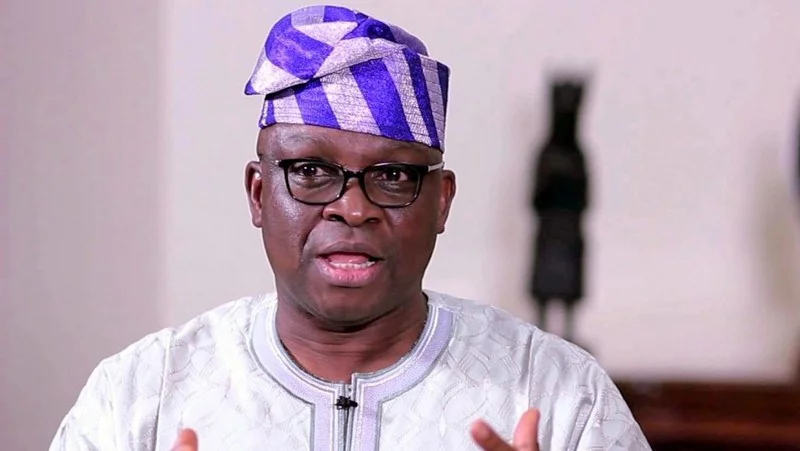After nearly six years of legal battles, the Fayose money laundering case has ended with a clean acquittal for the former Ekiti State governor, Ayodele Fayose.
On Wednesday, the Federal High Court in Lagos ruled that the Economic and Financial Crimes Commission (EFCC) failed to prove its ₦2.2 billion case against Fayose and his company, Spotless Investment Ltd.
Delivering the judgment, Justice Chukwujekwu Aneke upheld Fayose’s no‑case submission, saying the prosecution had not linked the defendant to the alleged crimes strongly enough to warrant a defence.
EFCC allegations failed to convince the court
The Fayose money laundering case began back in October 2018, when Fayose was first arraigned alongside Spotless Investment Ltd on 11 counts of money laundering, fraud, and theft.
Prosecutors accused him of receiving ₦1.2 billion from then Minister of State for Defence, Musiliu Obanikoro, to fund his 2014 gubernatorial campaign, money allegedly traced to the office of the former National Security Adviser.
Fayose was also charged with taking $5 million in cash without passing it through financial institutions, and laundering over ₦1.6 billion to acquire properties in Lagos and Abuja through companies like De Privateer Ltd and Still Earth Ltd.
Why the court dismissed the Fayose money laundering case
In his ruling, Justice Aneke held that the EFCC failed to establish a prima facie case.
Key prosecution witnesses and documents, the judge said, were insufficient to prove Fayose’s direct involvement.
Fayose’s defence team, led by Senior Advocates Kanu Agabi and Olalekan Ojo, had earlier argued that:
-
The alleged offences lacked a foundation because no co‑conspirator (like Abiodun Agbele) was jointly charged.
-
The evidence presented failed to show criminal breach of trust or conspiracy directly tied to Fayose.
-
The predicate offences underpinning the Fayose money laundering case were weak.
The court agreed, noting the absence of credible evidence linking the former governor personally to the funds described as crime proceeds.
Years in court, but no guilty verdict
The high‑profile trial spanned several years and two judges. Initially, before Justice Mojisola Olatoregun, the case was transferred in 2019 to Justice Aneke after the EFCC petitioned for reassignment.
Throughout, Fayose pleaded not guilty, was granted ₦50 million bail, and maintained that the charges were politically motivated.
Wednesday’s judgment finally brings an end to a chapter that has loomed over Fayose’s post‑gubernatorial career and shaped debates about selective prosecution and Nigeria’s anti‑corruption fight.
What is next after the Fayose money laundering case?
For the EFCC, the acquittal raises tough questions about evidence gathering and case strategy, especially in politically charged matters.
Legal analysts suggest the agency may appeal, but for now, Fayose walks free, his name cleared by the court.
For Fayose himself, the collapse of the Fayose money laundering case marks a significant personal and political victory. After years of travel restrictions, court appearances, and public scrutiny, he can now focus on rebuilding his influence in Nigerian politics.
A test of Nigeria’s anti‑corruption approach
While the EFCC has secured notable convictions in other high‑profile matters, critics say losses like the Fayose money laundering case highlight gaps in investigation quality and prosecutorial tactics.
Supporters of Fayose see the acquittal as proof that the charges were baseless from the start. Opponents argue that even if the case failed in court, it still raised serious questions about campaign finance and public office accountability.
Either way, the judgment ends one of Nigeria’s most watched corruption trials of recent years, underscoring the delicate balance between politics, law, and public trust.
As the dust settles, the Fayose money laundering case will remain a reference point in debates about justice, fairness, and the true strength of Nigeria’s legal system.
Oil price slips to $66.36 as Trump’s 50‑day warning rattles traders

